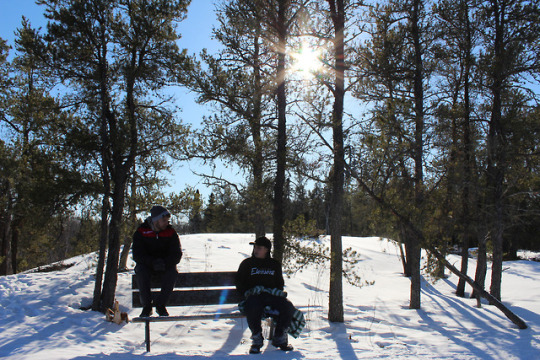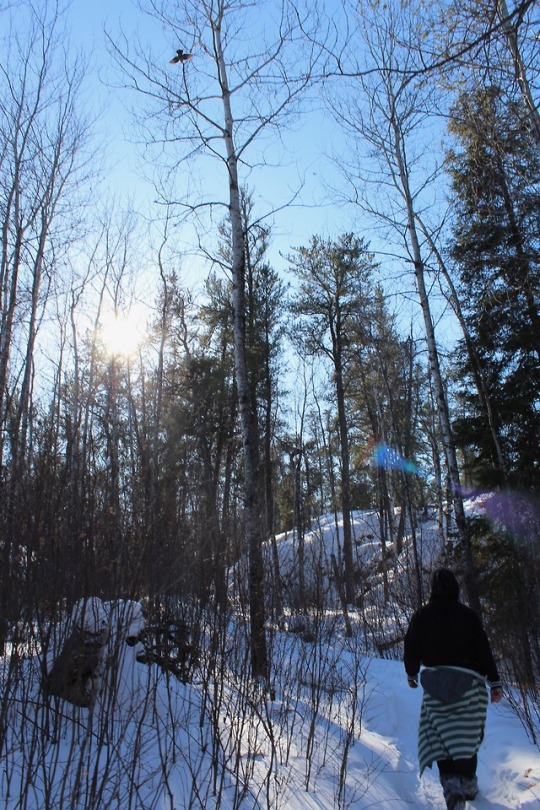Text
Oceans
My primary concern about the oceans is over fishing. We are taxing 90% of our global fisheries at capacity or over capacity (1). By doing this we put species at risk of extinction or extirpation. If people could do little things like watch what they buy and pick the fish that isn’t being harvested by outdated and unsustainable techniques, we can make an impact globally by telling business we don’t want to eat fish that are at risk. We can do this by looking at the good fish guide at this following link.
https://www.mcsuk.org/goodfishguide/search
(1) Global Fish Stocks Depleted to 'Alarming' Levels. (2016, July 09). Retrieved April 05, 2018, from https://www.ecowatch.com/one-third-of-commercial-fish-stocks-fished-at-unsustainable-levels-1910593830.html
0 notes
Text
Food
What I like about food is how it can change your mindset, attitude and your day to day well being. For example, in the summer time I like to prep my meals for work I usually have garden vegetables and a protein. By doing this I feel better mentally and physically than I do when I am in school and eating fast food. I personally like my own food better I just choose to eat fast food when I am in school because either I do not have enough time to prep, or I am away from my house for more than 10 hours. Eating out actually costs more for me because when I eat fast food I usually eat to much, (a foot-long instead of a 6-inch sub) by buying fast food so much I am increasing my food waste, and garbage. If I make my own food instead of throwing away the wrappers I have a reusable container which I can use daily. Even this little amount can save lots of garbage from our landfills. I think if I planned a better I could bring lunches every day and this is my goal for school year 2018.
0 notes
Text
Zoos
In my environmental science class, we talked about the topic of zoos, are they ethical do they serve a purpose in our society and should we keep larger animals in them. These are some of the questions that we went over in our class. I think zoos play a big part in educating young kids about serious issues like endangered and extinct species by showing them how awesome some of these animals are and how humans have impacted their species and some of the ways we are trying to rectify our mistakes. This also helps us to see mistakes that could be made in the future and how to combat them before they are made. I know for myself going to the zoo as a kid I learned a lot about animals and ways we can help them and respect them. I think zoos should have a role to play in conservation, because they can provide insight on how animals interact and give humans information to help them in case they become endangered. I think in some cases it is ethical to keep animals in zoos. For example, if there is a lost, old, endangered, or a species soon to be extirpated I think zoos have an obligation to take animals in. Some animals I feel don’t belong in zoos like dolphins and apes because there is scientific evidence that they know they are being held in captivity. I do enjoy going to zoos I haven’t been in a long time but the last time I went I had a good time.
0 notes
Text
Red Panda from the Calgary Zoo
Saving the "Other" Panda. (n.d.). Retrieved April 05, 2018, from https://www.calgaryzoo.com/keep-it-wild/saving-other-panda
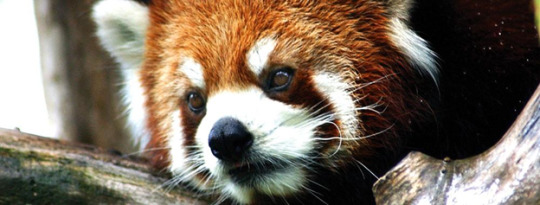
0 notes
Text
E-Waste
I investigated where my family has been disposing of their old electronics. I found out that past Walkman’s, iPod’s, and computers have been thrown either under our crawlspace or in a box we have full of cords and battery chargers. Either this stuff doesn’t work or is outdated I do not know why we keep it around. I will dispose of them appropriately in an e-waste recycling bin. If you follow the link below you can see where to put your electronic waste in Manitoba.
http://www.recyclemanitoba.ca/where-to-recycle/electronics/computers-and-peripherals/winnipeg
0 notes
Text
Weekly Purchases
For my environmental class we monitored our expenses for a week and took a look at were we spent our money. We categorized these in good, bad and ugly. Most of my expenses were food, beer, gas and movies. I put almost all my food and beer into bad since it was big companies and I wasn’t supporting my local business’s. The total dollar amount spent on food at big business’s is 63.75$. I categorized eating at a local restaurant and going to a movie in the good category and that total was 30.10$. Finally, the ugly I put my gas expenditures as ugly because we should strive to go green and find alternative modes of travel, by showing how much we spend on gas could influence us to a cleaner mode of transportation. The total amount I spent on gas in one week was 46$. This is less then later years because I am carpooling to the university twice a week.
0 notes
Text
Personnel Care Products
For my Environmental Science class, I launched a small investigation into my personnel care products. The products I looked at were my deodorant, my shaving cream, and my body spray. For my deodorant there are some toxic ingredients at low level risk like Aluminum Zirconium. This ingredient has a low level organ risk non reproductive according to EWG’s Skin Deep cosmetic data base (1). Another product I looked at was my shaving cream and what most surprised me was a moderate risk for endocrine disruption and occupational hazards like persistence and bio accumulation. This is according to EWG’s Skin Deep cosmetic data base. The final product I looked at was my body spray it has a moderate organ toxicity and low enhanced skin absorption according to EWG’s Skin Deep cosmetic data base.
Reference
(n.d.). Retrieved April 05, 2018, from http://www.ewg.org/skindeep/#.WsZChExFzVI
0 notes
Text
Action - Hiking Pine Point Trail
For my winter activity I went for a hike at pine point rapids. I hiked all of the trails around the river this took most of an afternoon. The hike was super relaxing and made me feel more in tune with nature this was helped with the fact that the temperature was around -7 degrees Celsius. To appreciate nature my friends and I just sat in silence on a log and took in the effect of our surroundings, that little time we spent sitting was very calming and felt timeless. If we would have brought sandwiches the hike would have been better. I love winter activities and wished I would have snowboarded this winter. An activity I want to try in the future is an ice plunge.
0 notes
Text
Listen (slow movement)
After listening to the podcast by Carle Honore (1) about cell phones and their impact on our day to day lives and how the slow movement is being incorporated. I discovered some of the challenges and opportunities that cellphones can make with the slow movement. Some of the opportunities that the slow movement can create in our day to day lives is its impact on cell phones. A manufacturer by the name of Punkt has made the “dumb smartphone”. This phone has no internet and only can call or text and other simple accessories like a calendar or alarm. By having no internet this company has given us the opportunity to interact with people and observe more in our day to day lives. I was thinking about how in my own life how I could incorporate this system by weighing the pros and the cons. Some of the pros are it costs less, it is proven that you are less dependent on your cell phone and can be alone without anxious thoughts, and finally it helps provide a sense of human interaction less talking through the social media and more direct personal connections. Some of the cons are you’re replying speed to emails or important messages is slowed, an example of this is teachers usually cancel class in advance and your more likely to see this on your cell phone. Other cons are maps I know myself I use the maps function on my cellphone frequently, also music storage on your phone. We have become reliant on apps and I think it will be hard to turn back for most of the population. I have already looked at buying a dumb smartphone and it seems to me economically smart as I would save just over 500$ a year just in my phone bill. I think by doing this it could benefit my social well being and help me make more personable relationships. An cell phone enthusiast gives us his take on the dumb smartphone youtuber Unbox Therapy, on his show he brought up some of the challenges the slow movement has in our modern-day, a link to his account is at the bottom of the page.
https://www.youtube.com/watch?v=zYC0gw7g1zA
(1) Welcome to The Slow Revolution, the podcast that explores the pros and cons of slowing down in a fast, impatient world. (n.d.). Retrieved April 05, 2018, from http://www.carlhonore.com/unlock-slow/podcasts/
0 notes
Text
Read
After reading a part of truth and reconciliation I learnt a little more of how Canadians have oppressed the first nations and how we are trying to reconcile our mistakes. This corresponds to the UNs sustainable development goals in a number of areas. One of them in particular was reduced inequalities. I think this out of all of them related to this topic because the basis of reduced inequalities is reconciliation.
One of the United Nations sustainable development is reduced inequalities. This relates to the topic of reconciliation. Reconciliation is the mending of wrong doings, in our case the Canadian government is trying to mend the wrong doings of the past. The Canadian government forced aboriginal children into residential schools, in these schools the children were abused and mistreated. The mandate for these schools was to teach the children about our culture while trying to separate them from their traditions and culture. By doing this the Canadian government was implying that our culture and way of life was better than theirs, they couldn’t understand that the two cultures were just different. A video you can watch on this topic is we were children it is a Canadian made program showing the treatment of the children and some of the experiences that they had to endure. Canada’s goal now is to reconcile the past and to try teach people of the wrong doings we have committed and how we can move forward in the future as a strong community.
Another topic I found interesting was how the Canadian government attacked the peoples culture. They replaced strong leaders with leaders they could control and in many cases disempowering aboriginal women as leaders. This relates to another of the United Nations goals of gender equality. For there to be reconciliation I feel that we will have to try and get women back as leaders in the aboriginal community.
https://www.nfb.ca/distribution/film/we_were_children
Honuring the Truth, Reconciling for the Future. (2015, July 23). Retrieved January 31, 2018, from http://www.trc.ca/websites/trcinstitution/File/2015/Honouring_the_Truth_Reconciling_for_the_Future_July_23_2015.pdf
0 notes
Text
Appreciating Nature
I went for a walk today in the bush behind my yard. During my walk I thought about how quiet it was, far enough away that all you heard was the sound of the wind through the trees and the snow at my feet. While I was thinking about this I felt calm and at peace. I felt connected to the bush even though its only a couple hundred metres or so from my house. I haven’t walked around it in awhile it was nice to go through and walk around smelling the crisp air and taking in the scenery. This exercise brought me back to realizing nature is all around us and all we have to do is go outside and enjoy it.
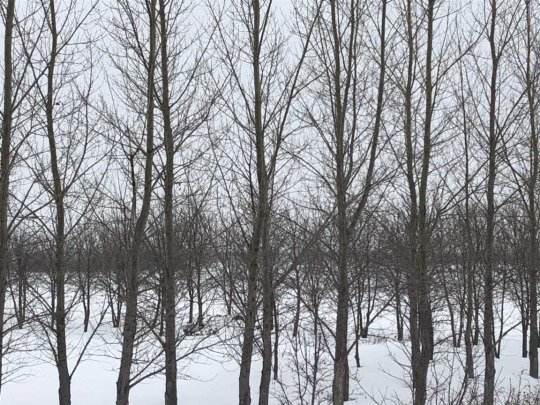
Here is a picture leading to my bush the trees are very bare and you can almost see the silence in the picture.
0 notes
Text
Discussions
In my environmental class we talk about environmental issues. A couple of these topics are Canadian Parks, our views of nature, and as a society our growing disconnect from nature.
As a society I think we are in danger of disconnecting from nature. As I have grown older I see more and more disconnection between humans and nature. This disconnect stems from our lifestyles, work, and how we choose to spend our free time. In our time we have a deep connection with our electronic devices. Everywhere I go I see people on there phones or listening to music instead of appreciating their surroundings and taking in nature. Even if it is just the cool air or summer breeze this can give you a positive feeling instead of being on your phone which blocks out all other senses. A way to lead people to connect with nature is school camping trips. I was lucky enough that my family loves camping and has taught me to appreciate nature. Some of my friends who didn’t have the opportunity to go on family camping trips were able to do so through middle school. I think this is a perfect age to start learning about our environment and how we interact with it in positive ways. It gives us as a society a base to build our environmentally friendly lifestyle and to build a connection with our planet. By going on these trips, it gives us more incentive to do the little things which could make a bigger impact overall. I think by giving kids the experience of seeing nature first hand and interacting with it makes the choice easier than if you just tell them to make environmentally smart choices.

Here are some pictures of mine of the differences experiencing nature on a screen or experiencing it in real life.
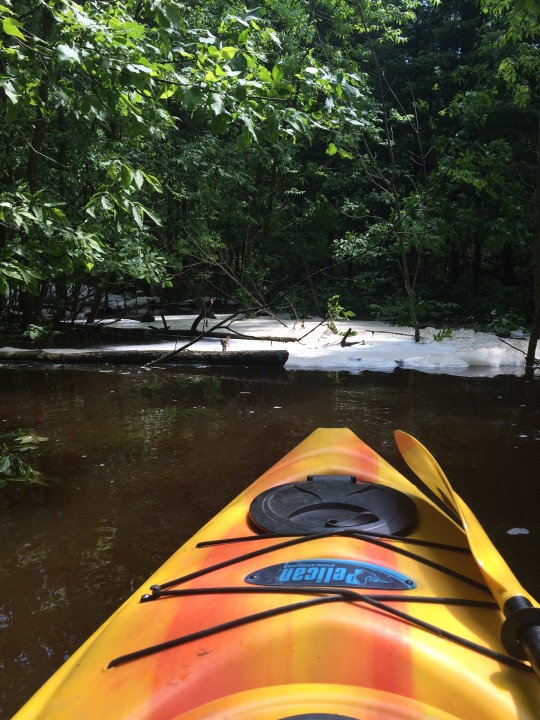
One of the topics brought up in my Environmental class was the topic of how we view nature and our thoughts on the different viewpoints. The three viewpoints we discussed were ecocentric , anthropocentric, and biocentric. Biocentric is the belief that we should protect and preserve each individual while ecocentric is the belief that we should protect the whole ecosystem instead of every individual. Finally, the anthropocentric view is the belief that environment should be used to satisfy human needs. I have thought a lot on this question and have talked to a variety of people on the issue. What I have concluded from this is people usually don’t have a single pure view lifestyle. There are shades of grey and some aspects fit better in situations than others. I believe that you can have a general view in an area but to fully say you are anthropocentric or ecocentric. Biocentric is very hard to do and I think that most people have a similar viewpoint.
Another topic we talked about in class are Parks and how they should be run. Should we run them geared toward protecting the wildlife solely or provide access to the people. I believe parks can meet their expectation to protect and provide accessibility. There would have to be a good system put into place. One of the examples we talked about is Wapusk national park in northern Manitoba. From what I have seen and heard, Wapusk is only available to a select few individuals who either have money or are going for academic purposes. In an ideal world we would have the park open to a certain amount of people a day/week/month. I think we could achieve this by offering a section up for the general population. Banff national park does a good job of this by providing protection and access. Its not a perfect system, but I think if you wanted to provide access and not just protection this is the best way to do it. Banff is constantly studying animal behaviours and their travelling patterns. By doing this it helps to keep the animal human interactions to a minimal and to keep the animals and wildlife safe. If the park staff was able to make trails with clear markers and have staff members always on site, I think that the general public would be able to experience the park in a way that is beneficial to them and not harmful to the ecosystem of the park.
Here you can barely notice the trail in Banff National park this is the one of the things we can do with Wapusk, not changing the ecosystem to fit human needs just providing a trail so humans don't interact with the wildlife.
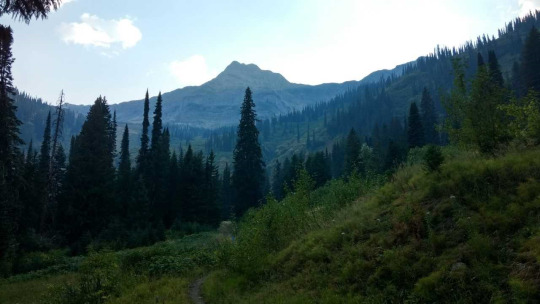
0 notes
Text
Watch
In my environmental class we discuss a variety of environmental issues. In many cases the general population doesn't even know about these issues. Just raising awareness helps to combat these problems. Here are two examples of Issues that you might not have heard of.
The first topic is our understanding of how forests work and the complex ecosystem we over look. After watching the video How trees talk to one another – Ted Talk, Suzanne Simard I started to think about how I viewed nature and what I considered to be living and in a community. As a student studying environmental issues I have more of a green view on topics. One example of this is forests, some people would view our forests as a resource, others just a place that trees grow. My view on forests is like many others on the point that they are a diverse ecosystem which provides a living space for many animals, plants, and other life forms. After watching How trees talk to one another my look on the forest has changed. I thought before that the trees were just in the soil not interacting directly with the ecosystem after listening to talk about the evidence she found that the trees communicate with each other and how they help each other out with transfers of chemicals and water even defense signals. This tells me we need to understand more about ecosystems before we take and not think of what an impact we could potentially make. An example of this is in her investigation professor Simard found that there are certain trees that are essential to supporting life around them she calls them mother trees. These trees are the ones we should avoid cutting down due to the knowledge and resources they have. If we left these trees it significantly helps the recuperation rate of the surrounding forest. By doing little things like this we promote sustainable development and hopefully show how we can both protect and harvest without disrupting the balance.
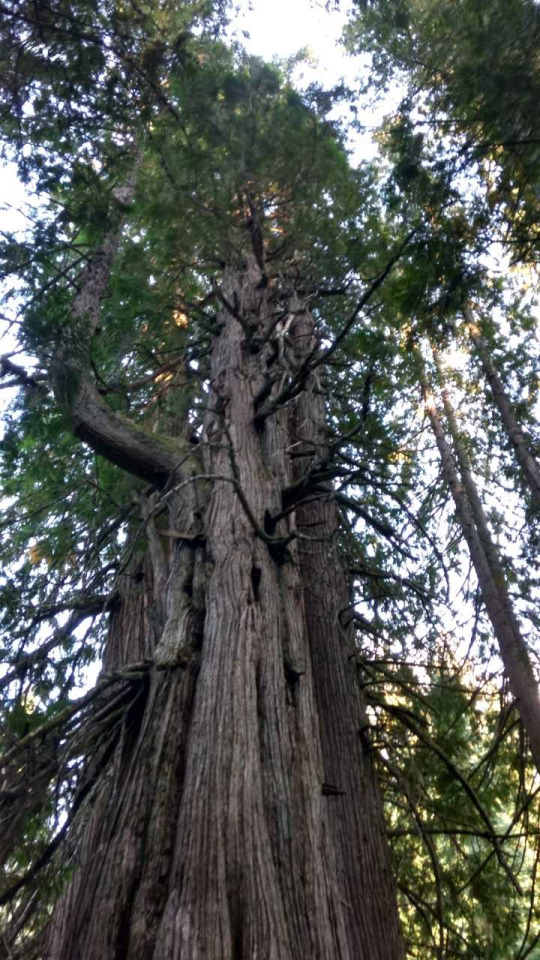
This is a picture I took of a massive tree just outside of Fernie, BC. This area is protected from logging because of the ski hills and mountain biking trails in the area.
Simard, S. (2016, June). Suzanne Simard: How trees talk to each other [Video file]. Retrieved from https://www.ted.com/talks/suzanne_simard_how_trees_talk_to_each_other
Another topic I watched was the video Why I love vultures – Ted Talk, Munir Virani. I learned about some of the impacts and possible outcomes of the declining vulture population. Most people view vultures as just a bird or even a pest but in fact it is almost the opposite of a pest. Vultures are an essential part of many ecosystems they are the grave diggers of many ecosystems, they are decomposers who eat the flesh of dead animals. This helps prevent the spread of disease. Vultures are threatened because they are being poisoned by humans, we are not specifically targeting vultures but they are the collateral damage of the poisoning of big cats and the pain killers given to farm animals. If this key species become extinct this could severely impact the control of diseases spreading. These birds are more important than people realize, and just talking about the issue and letting people know helps them. If more people are informed and realize what is happening can help persuade governments to ban chemicals, poisons, and the hunting of these birds.
Verani, M. (2012, May). Munir Verani Why I love vultures [Video file]. Retrieved from https://www.ted.com/talks/munir_virani_why_i_love_vultures
0 notes

